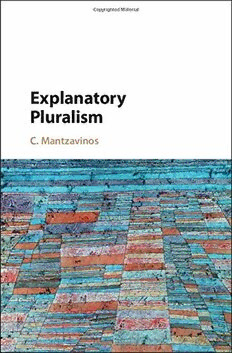
Explanatory Pluralism PDF
Preview Explanatory Pluralism
Explanatory Pluralism Explaining phenomena is one of the main activities in which scientists engage. This book proposes a new philosophical theory of scientific explanation by developing and defending the position of explanatory pluralism with the help of the notion of “explanatory games”. Mantzavinos provides a descriptive account of the explanatory activity of scientists in different domains and shows how they differ from commonsensical explanations offered in everyday life by ordinary people and also from explanations offered inreligiouscontexts.Healsoshowshowanevaluationandacritical appraisal of explanations put forward in different social arenas can take place on the basis of different values. Explanatory Pluralism provides solutions to all important descriptive and normative problemsof thephilosophical theory ofexplanation as illustratedin sophisticatedcasestudiesfromeconomicsandmedicinebutalsofrom mythologyandreligion. c. mantzavinos isProfessorofPhilosophyoftheSocialSciencesat the University of Athens. He has previously taught at Witten/ Herdecke, Freiburg, Bayreuth and Stanford and was a senior research fellowattheMaxPlanckInstituteforResearchonCollectiveGoods, Bonn.HehasheldvisitingappointmentsatHarvardandtheMaisondes Sciences de l’Homme, Paris. He is the author of Wettbewerbstheorie (1994), Individuals,Institutions, and Markets(CambridgeUniversity Press, 2001) and Naturalistic Hermeneutics (Cambridge University Press, 2005) and the editor of Philosophy of the Social Sciences (CambridgeUniversityPress,2009). Explanatory Pluralism c. mantzavinos UniversityofAthens UniversityPrintingHouse,CambridgeCB28BS,UnitedKingdom CambridgeUniversityPressispartoftheUniversityofCambridge. ItfurtherstheUniversity’smissionbydisseminatingknowledgeinthepursuitof education,learningandresearchatthehighestinternationallevelsofexcellence. www.cambridge.org Informationonthistitle:www.cambridge.org/9781107128514 ©C.Mantzavinos2016 Thispublicationisincopyright.Subjecttostatutoryexception andtotheprovisionsofrelevantcollectivelicensingagreements, noreproductionofanypartmaytakeplacewithoutthewritten permissionofCambridgeUniversityPress. Firstpublished2016 PrintedintheUnitedKingdombyClays,StIvesplc AcataloguerecordforthispublicationisavailablefromtheBritishLibrary LibraryofCongressCataloginginPublicationdata Mantzavinos,Chrysostomos,author. Explanatorypluralism/C.Mantzavinos. NewYork:CambridgeUniversityPress,2016.|Includesbibliographical referencesandindex. LCCN2016006869|ISBN9781107128514(hardback) LCSH:Explanation.|Socialsciences Philosophy.|Science Philosophy. LCCBD237.M362016|DDC121/.6 dc23 LCrecordavailableathttp://lccn.loc.gov/2016006869 ISBN9781107128514Hardback CambridgeUniversityPresshasnoresponsibilityforthepersistenceoraccuracyof URLsforexternalorthirdpartyinternetwebsitesreferredtointhispublication, anddoesnotguaranteethatanycontentonsuchwebsitesis,orwillremain, accurateorappropriate. ΣτήνμητέραμουΝίκη πούμ᾽ἒμαθεν᾽ἀγαπῶτάγράμματα Contents PrefaceandAcknowledgments pageix 1 Introduction 1 2 TheWrongQuestion:WhatisanExplanation? 3 3 ABriefOutlookontheSocialSciences 10 3.1 NeoclassicalMicroeconomicTheory 10 3.2 SocialMechanismsinSociology 14 3.3 Econometrics 16 4 TowardsExplanatoryPluralism 19 4.1 ExplanatoryPluralismisIndependent oftheNatureofCausality 20 4.2 ExplanatoryPluralismisIndependent oftheValidityofReductionism 24 4.3 ANonapologeticStancetoExplanatoryPluralism 28 5 TheExplanatoryEnterprise 31 5.1 WarumReknetz? 32 5.2 TheCognitiveDivisionofExplanatoryLabour 32 5.3 TheExplanatoryProcess 37 6 TheRulesoftheExplanatoryGame 40 6.1 AnAbstractCharacterizationoftheRules oftheGame 41 6.2 ACaseStudyfromEconomics 49 6.3 ACaseStudyfromMedicine 63 vii viii contents 7 ThePluralityofExplanatoryGames 97 7.1 TheHorizontalDimension 97 7.2 TheVerticalDimension 102 8 ExplanatoryActivityasProblem-SolvingActivity 107 8.1 TheProblemSolvingFramework 107 8.2 OldandNewProblems 111 8.3 TheExplainerasaProblemSolver 117 9 ExplanatoryRulesasSharedRules 126 9.1 TheContinuityThesis 126 9.2 SharedRulesasSharedProblemSolutions 128 9.3 TheNormativeDimension:TheInstitutional Framework 130 9.4 OntheEmergence,ChangeandAdoption ofExplanatoryRules 135 10 NormativeAppraisal:AProceduralConception 154 10.1 TheProceduralView 154 10.2 TheHierarchyofProblems,RulesandValues 155 10.3 TheMultidimensionalityoftheCriticalAppraisal 158 11 ExplanatoryMethodologyasTechnology 163 11.1 TheMünchhausenTrilemma 163 11.2 BetweenDogmatismandRelativism: TheMiddleGroundPosition 166 11.3 ExplanatoryMethodologyasaRationalHeuristic 170 11.4 ExplanatoryProgressandExplanatoryRegress 178 12 Epilogue 186 References 189 NameIndex 214 SubjectIndex 219 Preface and Acknowledgments TheAlteBurseisawonderfulduskypinkbuildingwithasymmetrical facadeinTübingen.Builtin1480,itisthedomicileofthePhilosophy Department. It borders the Tübinger Stift in the west where Hegel, Schelling and Hölderlin passed their years as students and the HölderlinturmintheeastwhereHölderlinspentthelastyearsofhis life. The two separate entrances to the Alte Burse, which can be reached through two separate staircases built in opposite directions to each other, show how a lively philosophical dispute can leave its track on a building. This architectonic peculiarity goes back to the early modern Universalienstreit, which led, in Tübingen, to the erection of a wall in the building that separated the Alte Burse in two halves and so created a separate entrance respectively for the two “ways”, the Via antiqua and the Via moderna, left for the “Nominalists” and right for the “Realists”. The wall was removed only during the Reformation when conflicts of a more rebellious characterbrokeout.But thetwo entrancesremained,amemorialto theirreconcilablecontroversybetweentwocompetingapproachesto whatconstitutesscientificknowledge,acontroversywhichhastaken newturnsandmanifestationsduring thecenturies andstillcallsfor arbitrationtoday. HörsaalXoverlookingtheNeckarRiveristhefocalpointofthe intellectualactivityintheAlteBursetoday.Itwasinthisroomthat I attended in the Sommersemester 1991 the Hauptseminar on Popper’s “Logik der Forschung” offered by Professor Keuth which also included the analysis of Hempel’s “Aspects of Scientific Explanation”. The discussions on scientific explanation in this room, overlooking the Platanenallee on the Neckarinsel, have had alastingimpressiononme.Although Ihaveturnedmyattentionto ix x preface and acknowledgments otherproblemsovertheyears,Ihavealwaysretainedakeeninterest in explanation as the core theoretical activity in science. About a decade ago, I set out to develop my own theory of explanation which has taken preliminary shape in my essay entitled “Explanatory Games”, published in the Journal of Philosophy in 2013. The present book contains a more complete treatment of my proposal on how to think about the core theoretical activity, explanation. Icannotpretendthatmyendeavourhasbeenasuccessfulone,if judged according to what I originally set out to accomplish. The contrary is the case. What I set out to accomplish was to developmyownmodelofexplanationwhichwouldideallysharethe positive features of the Popper-Hempel view: rigour, simplicity and universal scope. But, through the years, it has become increasingly clear to me that the development of such a unitary model of explanation would be yet another philosophical fiction vis-à-vis the actualexplanatoryactivitiesinwhichscientistsengage.Andthatin the end, it would share the fate of all such philosophical fictions: to be rightly ignored.Igraduallybecameaware,thus,thatthemain tasktobeaccomplishedwastodevelopageneralframeworkcapable ofaccountingforthepluralityandvarietyofexplanatoryactivitiesin science and in everyday life. The philosophical theory thatI offer in this book consists of my proposal of how this task can be best accomplished. Overthe years many people whomI wouldlike to thankhave influencedmythinkingontheproblemsthatIdealwithinthebook. TheoriginalinfluencehascomefromHerbertKeuthandHansAlbert in exchanges in Tübingen and Heidelberg. I have received decisive impulsesfromPhilipKitcherinmanydiscussionsthatwehavehadin Germany,theUnitedStatesandinGreece.Iamverygratefulforhis kindnessandencouragement,whichhavebeeninvaluableduringall the stages of the development of the book. I owe special thanks to Sandra Mitchell my acquaintance with her integrative pluralism through her writings and through our personal exchanges has been
